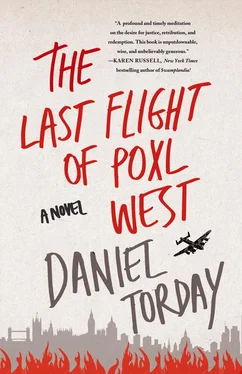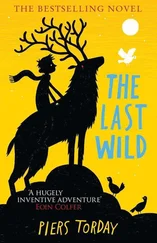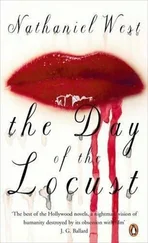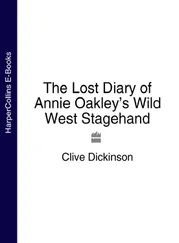Niny and I felt no need to turn the radio on that night, only sat and watched as the candles in the hanukiah burned down, wax puddling on the table. When it was cold, and again hard, we picked at it. Wax lodged under our fingernails. It was a good pain, wax pushing at the space between finger and nail. We both picked as we could, let it sink in until we no longer spoke at all.
8.
Three days had passed since Christmas. Back in Corbett’s Passage I slept on a thin, hard bunk. An ominous lull impelled the days after the holiday. Each evening we waited for the sirens and kept our shades tight.
Then it was the end of December, and we’d almost made it to 1941 on a week without bombing. The night of the twenty-ninth, Clive and I left when dark fell. After receiving four separate calls from dispatch all at once, we were to hit whichever fire we could reach safely on the bombed-out streets. We took the truck around Southwark. The two of us sat up front. In the back was the rest of our crew, the squaddies we’d been working with the past month — Townshend, Highbridge, Clampton, and Gingham. We’d become a unit.
The night was obscure under dark clouds. We heard the grinding of passing planes and watched as ack-acks were aimed. Spotlights searched the sky, but the low ceiling of clouds rendered them useless. Air raid sirens sounded. Looking out over the city we saw three, four, ten bright yellow tracers. I imagined they had come down with a narrow thwooping sound, though we instead heard the low rumble of the rescue squad’s truck and the wail of sirens and the heavy mechanical churning of the Luftwaffe planes we’d grown to expect: a sound like every radio and truck on the Continent all thrown in a straight grinding line above the city, like electricity itself traveling through the space above our heads.
I stopped the truck and got out. A huge spray of sparks spilled up from a single glowing rod like an enormous novelty sparkler. Sparks sprayed off. They landed, white-hot, on the pavement. The rest of the crew held back near the truck until Townshend called out, “We’re off to the Underground shelter to wait it out.” Clive motioned that we’d be along.
Phosphorous at the center of the sparks was so white we couldn’t look at it straight on. If an incendiary touched you it could burn through to bone. The bomb sat in the road like something not entirely sure of itself. It threw shadows across the buildings around us — we were just south of the Thames, where long rows of dun brick buildings rose into the night. Here, near the river, were cobblestones laid with the perfect precision of an expert mason’s hand. Buildings around us were beginning to show the scarring from months of bombing. The restorative darkness of night left them glowing, shadows brushing over the flat stones. Bottoms of lampposts along the curb reflected a white glow back at the light.
If you lit so much as a match in the streets after the sirens sounded, a Home Guardsman would demand you put it out. But in the quiet dark of this night, here was a foot-long quiddity of light melting into the macadam and no one to chastise us. In the sky, a thin layer of clouds glowed like the exposed intestine of some primordial beast.
“Suppose we ought to find shelter ourselves, then,” Clive said.
We’d been advised, ahead of the dropping of these incendiaries, not to pour water on a bomb, but to put sand on it, or cover it in woolens, as the white-hot phosphorous at its center would explode when doused. They were harmless if you didn’t set them off with water, and if they didn’t find their way to fuel: wood, paper, buildings. Before we could begin to put the bomb out, hundreds more incendiaries were falling. The sky lit up and seemed to flex over our heads.
We found a shelter at the end of the block with the rest of our crew. Heavy bombs rocked buildings all around. At last the high solid tone of the all- clear came. When we turned back, the truck was in the middle of the street, where we had first seen the bomb. We got to the end of the block where now there must have been two- or three- dozen incendiary bombs littered all the way up to the bridge — there were far too many to try putting them out. Sparks up by the bridge lit the dim lip of the riverbank where the water receded, slimy black in the bright light of the incendiaries. Rooftops glowed, seared through by the incendiary bombs sliding hot and deadly through the roofs, instinctively seeking fuel to continue their insuperable burning.
I drove on. Clive said, “I think you’ve meant to take a right a ways back.” He wasn’t looking at me but up at the sky, which reflected the hundreds of small white lights battering up to the clouds. We passed London Wall. No new siren, only incendiary after incendiary smoldering on the macadam. Searchlights traced the underbelly of the sky, ack-acks seeking viable targets.
We whizzed up streets almost entirely devoid of people. Almost every man and woman had taken to the country for Christmas, enjoying a true holiday for the first time since the bombing had begun.
Another air raid siren sounded.
I pulled off and we ducked into the nearest Underground station. We stood midway down the steps. Explosive bombs began to fall again alongside the rain of incendiaries somewhere to the north of the city. That jarring bolt was much more familiar than the odd silence accompanying the incendiary strikes. As soon as the all- clear sounded we were all back out to the truck.
We reached Fleet Street. A couple hundred yards a head, a fire truck pulled up alongside the narrow entrance to Gough Square. A tendril of smoke lifted toward the lighted sky from inside the column on the other side of the buildings. A fireman was getting out of his truck and gearing up.
“A fire by Dr. Johnson’s,” the fireman said. In Gough Square was the house where Samuel Johnson had lived. “You’d do best to find shelter until this ends,” he said, pointing up around us. Every third building was afire.
“We’re rescue squad,” I said.
“Do your work and leave me to mine, then,” the fireman said.
We put on our coveralls and helmets. Fire burned on the top floor of Dr. Johnson’s House, and another across the way. The wind died and a great cloud of smoke obscured our view. There were four firemen standing outside the house — Throughout the war, AFS firemen were billeted at Dr. Johnson’s house, and there were still a few back at the station. Our attention went to the two small factories opposite. A bomb had landed in the middle of these two ten-story factory buildings. A second had landed on the façade of a residence on the far row across from where we had entered the courtyard, between these factories and Dr. Johnson’s House.
While the rest of our crew went to help the firemen, Clive went at the front of the smoldering mess with his pickax. Another air raid siren sounded and along with it the noise of Messerschmitts and Spitfires dogfighting overhead. Capricious winds from the two factories carried noxious chemical furies that burned our eyes.
“What do you suppose it is?” I said.
“Don’t know,” Clive said. “Looks like a chemical factory. Who knows what’s burning.” Clive continued to work at the rubble. The macadam was so hot the rubber soles of my shoes sucked with each step. A long beam fell inside the front of the building, casting a line across Clive’s leg. Red embers blew all around his head, tracers that now combined with red-hot bullets like those I would watch years later as they emitted from the machine guns on the Messerschmitts that tracked our Lancaster down over the Ruhr Valley.
“Suppose we’ll need to get up there with some sandbags, then,” the fireman who had led us into Gough Square yelled to them. Another large beam collapsed. It opened a large hole in the first floor, floorboards sucked down.
Читать дальше












